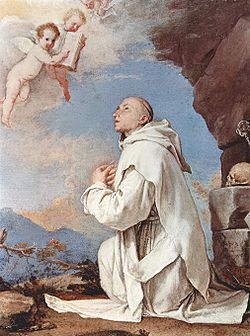Bruno of Cologne
| Saint Bruno of Cologne | |
|---|---|

Saint Bruno of Cologne, by José de Ribera
|
|
| Confessor, Hermit, Monk, Mystic, Founder | |
| Born | c. 1030 Cologne, Archdiocese of Cologne |
| Died | 6 October 1101 Serra San Bruno |
| Venerated in | Roman Catholic Church |
| Beatified | 1514 by Pope Leo X |
| Canonized | 17 February 1623 by Pope Gregory XV |
| Feast | 6 October |
| Attributes | Skull that he holds and contemplates, with a book and a cross, Carthusian habit |
| Patronage | Germany, Calabria, monastic fraternities, Carthusians, trade marks, Ruthenia, possessed people |
Bruno of Cologne (Cologne c. 1030 – Serra San Bruno 6 October 1101) was the founder of the Carthusian Order, personally founded the order's first two communities. He was a celebrated teacher at Reims, and a close advisor of his former pupil, Pope Urban II. His feast day is October 6.
Bruno was born at Cologne about the year 1030. According to tradition, he belonged to the family of Hartenfaust, or Hardebüst, one of the principal families of the city. Little is known of his early years, except that he studied theology in the present-day French city of Reims before returning to his native land.
His education completed, Bruno returned to Cologne, where he was most likely ordained a priest around 1055, and provided with a canonry at St. Cunibert's. In 1056 Bishop Gervais recalled him to Reims, where the following year he found himself head of the episcopal school, which at the time included the direction of the schools and the oversight of all the educational establishments of the diocese. For eighteen years, from 1057 to 1075, he maintained the prestige which the school of Reims attained under its former masters, Remi of Auxerre, and others.
Bruno led the school for nearly two decades, acquiring an excellent reputation as a philosopher and theologian. Among his students were Eudes of Châtillon, afterwards Pope Urban II, Rangier, Cardinal and Bishop of Reggio, Robert, Bishop of Langres, and a large number of prelates and abbots.
In 1075, Bruno was appointed chancellor of the Diocese of Reims, which involved him in the daily administration of the diocese. Meanwhile, the pious Bishop Gervais de Château-du-Loir, a friend to Bruno, had been succeeded by Manasses de Gournai, a violent aristocrat with no real vocation for the Church. In 1077, at the urging of Bruno and the clergy at Reims, de Gournai was suspended at a council at Autun. He responded, in typical eleventh century fashion, by having his retainers pull down the houses of his accusers. He confiscated their goods, sold their benefices, and even appealed to the pope. Bruno discreetly avoided the cathedral city until in 1080 a definite sentence, confirmed by popular riot, compelled Manasses to withdraw and take refuge with Emperor Henry IV, the fierce opponent of the Pope, Gregory VII.
...
Wikipedia
